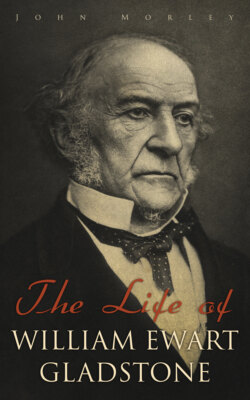Читать книгу The Life of William Ewart Gladstone - John Morley - Страница 75
На сайте Литреса книга снята с продажи.
FOOTNOTES:
Оглавление172.Perhaps I may refer to my Life of Cobden, which had the great advantage of being read before publication by Mr. Bright. Chapters xiv. and xv.
173.Lord Aberdeen to Senior, Sept. 1856. Mrs. Simpson's Many Memories, p. 233.
174.Sibthorp asked Peel in the H. of C. when Gladstone and Lincoln would appear. Peel replied that if S. would take the Chiltern Hundreds, G. should stand against him. S. retorted that the Chiltern Hundreds is a place under government, and he would never take place from Peel; but if P. would dissolve he would welcome Gladstone to Lincoln—or P. himself; and added privately that he would give P. or G. best bottle of wine in his cellar if he would come to Lincoln and fight him fairly.—Lord Broughton's Diaries.
175. Halifax Papers.
176.Cobden also wrote to Peel strongly urging him to hold on, and Peel replied with an effective defence of his own view. Life of Cobden, i. chap. 18.
177.'There is a name that ought to be associated with the success of these measures; it is not the name of Lord John Russell, neither is it my name. Sir, the name which ought to be, and will be, associated with these measures is the name of a man who, acting from pure and disinterested motives, has advocated their cause with untiring energy, and by appeals to reason expressed by an eloquence the more to be admired because it was unaffected and unadorned—the name which ought to be associated with the success of these measures is the name of Richard Cobden. Without scruple, Sir, I attribute the success of these measures to him.'
178.See Life of Lord Lyndhurst, by Lord Campbell, p. 163.
179.Six years later (Nov. 26, 1852), Mr. Gladstone in the House of Commons said of Cobden, with words of characteristic qualification:—'Agree you may in his general politics, or you may not; complain you may, if you think you have cause, of the mode and force with which in the freedom of debate he commonly states his opinions in this House. But it is impossible for us to deny that those benefits of which we are now acknowledging the existence are, in no small part at any rate, due to the labours in which he has borne so prominent a share.'
180. Parker, iii. pp. 434-5.
